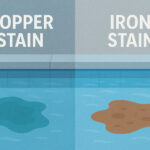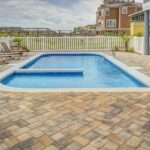You’ve heard the sales pitch: “Install a saltwater system and never worry about pool chemicals again!” or “Just add salt and you’re done!” If only it were that simple. After years of helping Tennessee saltwater pool owners recover from expensive mistakes caused by these dangerous myths, it’s time to set the record straight about what saltwater pools really are – and what they really require.
The truth is, a saltwater pool is still a chlorine pool. The only difference is how the chlorine gets into your water. Understanding this fundamental fact will save you thousands in equipment damage and help you enjoy the genuine benefits of saltwater swimming.
⚡ Saltwater Reality Check: “Your salt cell is an on-site chlorine factory, not a magic wand that eliminates pool chemistry forever.”
What Saltwater Pools Actually Are
The Science Behind Salt Chlorination
A saltwater pool uses a process called electrolysis to convert dissolved salt (sodium chloride) into chlorine gas, which immediately dissolves into the water as hypochlorous acid – the same sanitizing agent produced by traditional chlorine tablets or liquid chlorine.
The process simplified:
- Salt is added to pool water (typically 2,700-3,400 ppm)
- Water flows through the salt cell containing electrolytic plates
- Electricity splits salt molecules into sodium and chlorine
- Chlorine sanitizes the water exactly like traditional chlorine
- Sodium and chlorine recombine back into salt, repeating the cycle
What this means: Your saltwater pool is producing the exact same chlorine that kills bacteria and algae in traditional pools. The chlorine doesn’t know or care how it was created – it behaves identically regardless of its source.
The “Saltwater” Misconception
The term “saltwater pool” creates dangerous misconceptions. The salt level in these pools (about 3,000 ppm) is roughly 1/10th the salinity of ocean water. You can barely taste it, and it’s gentler on skin and eyes than traditional chlorinated water. However, calling it “saltwater” makes people think it’s fundamentally different from chlorine pools.
More accurate terms:
- Salt chlorine generator pool
- Electrolytic chlorine pool
- Self-chlorinating pool
- Salt-generated chlorine pool
🧂 Salt Truth: “The ‘salt’ in saltwater pools is just the raw material for chlorine production. Your pool is still 100% dependent on chlorine for sanitation.”
The Dangerous “Just Add Salt” Myth
Where This Myth Comes From
Unfortunately, this myth is perpetuated by:
- Uninformed pool builders who don’t understand water chemistry
- Equipment sales people focused on system sales, not long-term maintenance
- Pool owners who want to believe maintenance can be eliminated
- Marketing materials that oversimplify the technology
The Expensive Reality of Salt-Only Maintenance
Pool owners who follow the “just add salt” approach typically experience:
Year 1: Pool seems fine, owner feels vindicated about easy maintenance
Year 2: Equipment problems begin, water quality becomes inconsistent
Year 3: Major equipment failures, potential surface damage
Year 4: Thousands in repairs, possible salt cell replacement
Year 5: Complete system overhaul or conversion back to traditional chlorine
Common problems from neglecting water balance:
- Salt cell calcification and premature failure
- Pool surface etching or scaling
- Equipment corrosion throughout the system
- Impossible-to-eliminate algae problems
- Water that’s uncomfortable for swimming despite clear appearance
The Tennessee Climate Factor
Tennessee’s challenging climate makes balanced water even more critical for saltwater pools:
- High summer temperatures accelerate all chemical reactions
- Intense UV exposure breaks down stabilizer rapidly
- Heavy rainfall dilutes salt levels and affects all chemistry
- High evaporation rates concentrate all chemicals unpredictably
- Extended swimming season means more chemical demand for longer periods
⚠️ Maintenance Warning: “Tennessee saltwater pools that aren’t properly balanced fail faster and cost more to repair than traditional chlorine pools.”
Essential Chemical Balance for Saltwater Pools
All Five Pillars Still Required
1. pH Control (7.2-7.6) – More Critical Than Ever Saltwater systems naturally drive pH upward during chlorine generation. This is the #1 maintenance challenge for salt pool owners.
Why pH rises in salt pools:
- Electrolysis process creates hydroxide ions
- Higher pH reduces chlorine effectiveness
- Scale formation accelerates on salt cell plates
- Equipment damage occurs throughout the system
Tennessee salt pool recommendation: Stock up on pH reducer when you find it on sale. You’ll use 2-3 times more pH reducer than traditional pool owners.
2. Total Alkalinity (80-120 ppm) – Your pH Stabilizer Proper alkalinity prevents wild pH swings and protects your expensive salt cell from rapid pH changes.
Salt pool alkalinity challenges:
- Must buffer against constant pH rise
- Protects salt cell plates from scale formation
- Prevents corrosive water conditions
- Essential for consistent chlorine production
3. Stabilizer/Cyanuric Acid (30-50 ppm) – Still Essential Salt-generated chlorine is just as vulnerable to UV destruction as traditional chlorine.
Tennessee stabilizer considerations:
- Our intense summer sun destroys chlorine in hours without stabilizer
- Salt systems can’t keep up with chlorine demand if stabilizer is low
- Over-stabilization locks up chlorine just like traditional pools
- Regular testing prevents expensive salt cell overwork
4. Calcium Hardness (200-400 ppm) – Equipment Protection Proper calcium levels prevent your expensive salt cell and other equipment from corrosion or scale damage.
Salt pool calcium importance:
- Prevents aggressive water from attacking salt cell plates
- Protects all metal equipment in the system
- Prevents scale formation that ruins salt cells
- Essential for equipment warranty compliance
5. Salt Level (2,700-3,400 ppm) – The Raw Material Obviously critical for salt pools, but proper salt level alone doesn’t guarantee anything.
Salt level management:
- Too low: Insufficient chlorine production, system alarms
- Too high: Accelerated equipment corrosion, system damage
- Rain dilution: Regular testing and adjustment needed
- Evaporation concentration: Monitoring required
Weekly Algaecide: Your Safety Net
Why saltwater pools need algaecide: Salt systems can’t respond quickly to changing conditions. If chlorine production falls behind demand (equipment failure, power outage, chemistry imbalance), algae can establish before the system recovers.
Recommended routine:
- Weekly algaecide addition during swimming season
- Use non-metallic algaecides to avoid staining
- Increase frequency during heavy use or weather challenges
- Essential backup protection for system reliability
⚖️ Balance Truth: “Saltwater pools require the same five chemical pillars as traditional pools, plus salt level monitoring. That’s more testing, not less.”
The Real Cost Analysis: Salt vs Traditional Chlorine
Upfront Investment Comparison
Traditional Chlorine Pool Setup:
- Basic chlorine feeder: Budget-friendly option
- Chemical starter kit: Moderate initial cost
- Total initial chemical investment: Low
Saltwater Pool Setup:
- Quality salt system (Hayward/Pentair): Significant investment
- Initial salt purchase: Moderate cost
- Professional installation: Additional cost
- Total initial investment: High
Annual Operating Cost Reality
Traditional Chlorine Pool (Annual):
- Chlorine tablets/shock: Moderate annual cost
- Balancing chemicals: Low to moderate cost
- Total annual chemicals: Moderate
Saltwater Pool (Annual):
- Salt replacement: Low annual cost
- pH reducer (lots of it): Moderate cost
- Other balancing chemicals: Same as traditional
- Salt cell replacement (every 3-7 years): High cost amortized annually
- Total annual cost: Often higher than traditional when cell replacement is factored
Long-Term Financial Reality
Traditional chlorine approach:
- Predictable annual chemical costs
- Equipment lasts longer with proper water balance
- Lower repair costs due to simpler system
- Easy to switch between different sanitizers
Saltwater approach:
- Lower day-to-day chemical costs
- Higher equipment replacement costs
- More complex troubleshooting and repairs
- Expensive to convert back if desired
Bottom line: Saltwater isn’t necessarily cheaper – it’s a different payment structure. You pay more upfront and for equipment, less for ongoing chemicals.
💰 Cost Reality: “Saltwater pools aren’t about saving money – they’re about convenience and water feel. Choose them for the right reasons.”
Equipment Quality: Why Brand Matters
The Aftermarket Equipment Trap
Problems with cheap/unknown salt systems:
- Parts availability: Disappearing manufacturers leave you stranded
- Technical support: No one to call when things go wrong
- Local service: Pool professionals avoid unfamiliar brands
- Warranty support: Difficult to enforce with unknown companies
- Quality control: Inconsistent manufacturing leads to premature failure
Recommended Brands for Tennessee
Hayward AquaRite/TurboCell Series:
- Industry-leading reliability and support
- Wide parts availability throughout Tennessee
- Most pool professionals trained on Hayward systems
- Excellent warranty support and customer service
- Proven performance in Tennessee climate
- Premium automation integration capabilities
- Outstanding build quality and longevity
- Comprehensive local dealer network
- Advanced diagnostics and troubleshooting features
- Excellent performance in challenging conditions
Why these brands matter in Tennessee:
- Local dealers stock replacement parts
- Pool service companies are familiar with troubleshooting
- Warranty claims are handled efficiently
- Long-term manufacturer stability
- Proven performance in our climate conditions
Salt Cell Longevity Factors
What affects salt cell lifespan:
- Water balance quality: Proper pH prevents scale formation
- Usage level: More swimming = more chlorine demand = shorter cell life
- Tennessee climate: High heat and UV accelerate wear
- Maintenance routine: Regular cleaning extends cell life significantly
Realistic salt cell expectations:
- Good conditions: 5-7 years with proper maintenance
- Average conditions: 3-5 years
- Poor maintenance: 1-3 years (expensive lesson)
- Tennessee factors: Subtract 1-2 years from manufacturer estimates
🔧 Equipment Wisdom: “Buy cheap salt equipment, get cheap results. Buy quality equipment and maintain it properly, get years of reliable service.”
Saltwater Pool Maintenance Schedule
Daily Tasks (During Swimming Season)
- Visual water quality inspection
- Check salt system display for error codes
- Empty skimmer baskets if needed
Weekly Tasks (Non-Negotiable)
- Test and adjust pH (this will be frequent)
- Test chlorine levels produced by system
- Add weekly algaecide dose
- Check salt system operation and cleanliness
Bi-Weekly Tasks
- Test alkalinity and adjust if needed
- Brush pool walls and steps
- Clean pool filter
- Inspect salt cell for scale buildup
Monthly Tasks
- Test stabilizer and calcium hardness levels
- Deep clean salt cell if needed
- Test actual salt level with accurate meter
- Professional water analysis at pool store
Seasonal Tasks
- Spring: Complete system startup and calibration
- Summer: Monitor increased chemical demand closely
- Fall: Prepare system for reduced operation or shutdown
- Winter: Protect system from freeze damage
Tennessee-Specific Saltwater Challenges
Climate-Related Issues
Summer heat effects:
- Increased chlorine demand strains salt cell
- Higher pH rise rate requires more frequent adjustment
- Evaporation concentrates salt and all other chemicals
- Equipment works harder and wears faster
Storm aftermath:
- Diluted salt levels affect chlorine production
- pH changes rapidly with acidic rainwater
- Power outages stop chlorine production when demand is highest
- Debris load overwhelms system capacity
Extended season demands:
- Salt cells work longer than in northern climates
- More total chlorine production accelerates wear
- Equipment protection becomes more critical
- Higher annual operating costs than expected
Regional Water Considerations
East Tennessee (Softer Water):
- Lower calcium hardness requires careful monitoring
- Aggressive water attacks salt cell plates faster
- May need calcium hardness increaser regularly
Middle Tennessee (Variable Water):
- Inconsistent source water affects salt level calculations
- Municipal treatment changes affect starting chemistry
- Well water may have mineral content that affects salt systems
West Tennessee (Harder Water):
- Higher calcium content can cause scale formation
- More frequent salt cell cleaning required
- pH management becomes even more critical
Common Saltwater Pool Problems and Solutions
Salt Cell Scale Formation
Symptoms:
- Reduced chlorine production despite normal salt levels
- White, chalky buildup on cell plates
- System error codes or reduced output warnings
Causes:
- High pH allowing calcium scale formation
- High calcium hardness levels
- Inadequate cell cleaning routine
Solutions:
- Immediate pH reduction to 7.2
- Professional cell cleaning with muriatic acid
- Establishment of regular cleaning schedule
- Better pH monitoring and control
Impossible-to-Clear Algae
Symptoms:
- Algae returns immediately after treatment
- High chlorine readings but visible algae growth
- System running constantly but ineffective
Causes:
- High stabilizer levels locking up chlorine
- Poor water circulation and filtration
- Inadequate brushing and physical removal
- pH too high for effective chlorine action
Solutions:
- Professional stabilizer testing and potential water dilution
- Aggressive manual cleaning and brushing
- pH adjustment to 7.2 for maximum chlorine effectiveness
- Possible temporary conversion to traditional shock treatment
Premature Equipment Failure
Symptoms:
- Salt cell replacement needed every 1-2 years
- Frequent system error codes
- Inconsistent chlorine production
Causes:
- Poor water balance causing corrosion or scale
- Inadequate maintenance routine
- Cheap equipment not designed for Tennessee conditions
- Electrical issues affecting system operation
Solutions:
- Immediate water balance correction
- Professional system inspection and calibration
- Upgraded maintenance routine
- Possible equipment upgrade to quality brand
When Saltwater Pools Make Sense
Ideal Saltwater Pool Candidates
Good fits for saltwater systems:
- Pool owners committed to weekly water testing
- Families with sensitive skin or chlorine allergies
- Those who prefer softer-feeling water
- Owners willing to invest in quality equipment
- People who understand they’re still managing a chlorine pool
Poor Saltwater Pool Candidates
Not recommended for:
- Anyone expecting “maintenance-free” operation
- Extremely budget-conscious owners
- Those who rarely test traditional pool water
- Areas with unreliable electricity
- Pool owners who want simplest possible maintenance
The Honest Benefits of Saltwater Pools
Real advantages:
- Softer, more comfortable water feel
- No chlorine storage or handling required
- Consistent chlorine production when properly maintained
- Less skin and eye irritation for sensitive swimmers
- No chlorine smell when properly balanced
What saltwater pools DON’T provide:
- Elimination of chemical testing and balancing
- Significantly lower operating costs
- Simpler maintenance routines
- Protection from equipment problems
- Automatic water balance management
🏊♀️ Saltwater Success Formula: “Choose saltwater for water quality and swimmer comfort, not for reduced maintenance or cost savings.”
Making the Decision: Salt vs Traditional
Questions to Ask Yourself
Maintenance commitment:
- Are you willing to test water weekly year-round?
- Will you stay on top of pH management religiously?
- Can you handle more complex troubleshooting?
Financial considerations:
- Can you afford the higher upfront investment?
- Are you prepared for expensive salt cell replacements?
- Do you understand total cost of ownership?
Technical comfort:
- Are you comfortable with electrical pool equipment?
- Do you have reliable technical support available?
- Can you handle system calibration and maintenance?
Professional Installation Importance
Why professional installation matters:
- Proper electrical connections prevent dangerous failures
- Correct plumbing integration ensures optimal performance
- System calibration requires specialized knowledge
- Warranty compliance often requires professional installation
- Local codes may require licensed electrician involvement
What to expect from quality installation:
- Complete system testing and calibration
- Water balance adjustment for system startup
- Owner education on proper operation and maintenance
- Documentation for warranty and future service
- Ongoing support relationship with installer
Conclusion
Saltwater pools can provide an excellent swimming experience when properly understood and maintained. The key is approaching them with realistic expectations and a commitment to proper water chemistry management.
Remember: a saltwater pool is still a chlorine pool. The salt system is simply an on-site chlorine generator that requires the same attention to water balance as any pool. In fact, because of the complexity of the salt system and Tennessee’s challenging climate, saltwater pools often require more attention, not less.
If you choose a saltwater system, do it for the right reasons – improved water feel and swimmer comfort. Don’t choose it expecting reduced maintenance or significant cost savings. Invest in quality equipment from established manufacturers, commit to weekly water testing, and stock up on pH reducer.
Most importantly, ignore anyone who tells you that saltwater pools only need salt additions. This myth has cost Tennessee pool owners thousands in equipment damage and repairs. Your saltwater pool needs the same five chemical pillars as traditional pools: pH control, alkalinity management, stabilizer protection, calcium hardness balance, and consistent sanitation.
⚡ Final Saltwater Truth: “The best saltwater pools are maintained by owners who understand they’re still managing chlorine pools – they just make their chlorine on-site.”
With proper knowledge, realistic expectations, and commitment to maintenance, a saltwater pool can provide years of comfortable, enjoyable swimming. Just remember that there’s no such thing as a maintenance-free pool, regardless of how the chlorine gets into the water.
Considering a saltwater system for your Tennessee pool? Download our Saltwater Pool Decision Guide to evaluate if salt chlorination is right for your situation. Already have a saltwater pool but struggling with maintenance? Share your specific challenges in the comments and we’ll help you develop a proper maintenance routine.








